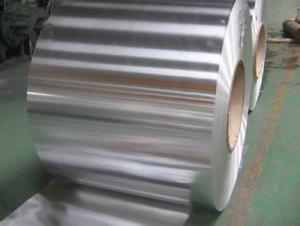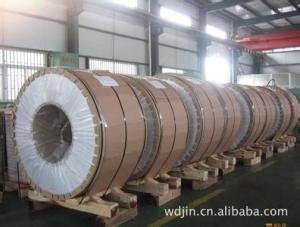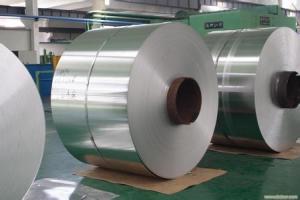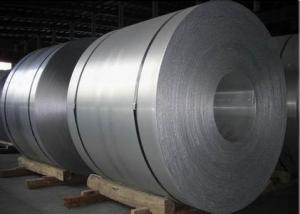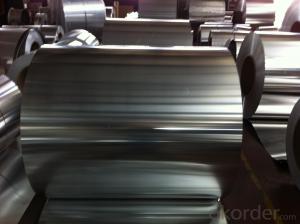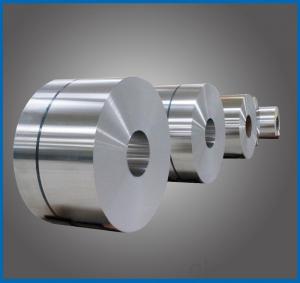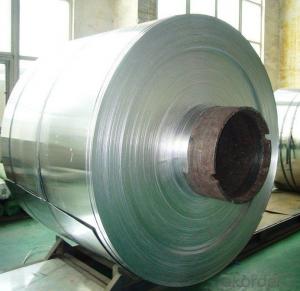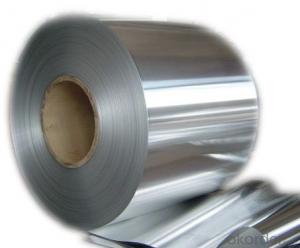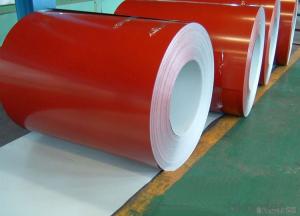Coated Aluminium Coils for ACP with High Quality
- Loading Port:
- Shanghai
- Payment Terms:
- TT or LC
- Min Order Qty:
- 5 m.t.
- Supply Capability:
- 100000 m.t./month
OKorder Service Pledge
OKorder Financial Service
You Might Also Like
1.Structure of Coated Aluminium Coils for ACP With High Quality
Coated Aluminium Coils for ACP is processed through the technics of roller coating and baking with precise polyester paints. Its color is glossy and with variety of colors enabling you to choose easily. Chromatic aberration is small, impact resistance is strong and easy to be processed, and all its performance has reached or surpassed the national criteria.
Coated Aluminium Coils for ACP are widely used in indoor and door decoration, ceilings, room surface tiles, corrugated boards, wall panels, advertisement boards, counters, home appliances, decoration in and out of autos and boats.
2. Main Features of Coated Aluminium Coils for ACP With High Quality
• Light Weight
• High Flatness
• Protecting Environment
• Good Weathering
• Colorful
• Recycling
• Saving Energy
• Rustproof
3. Coated Aluminium Coils for ACP With High Quality Images
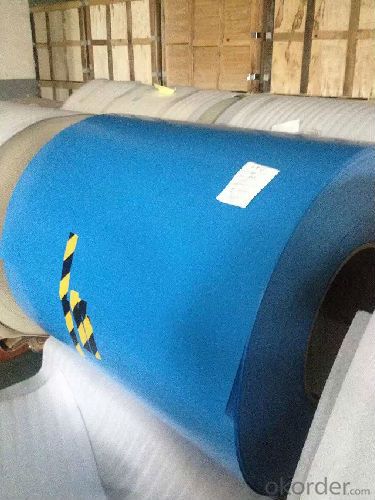
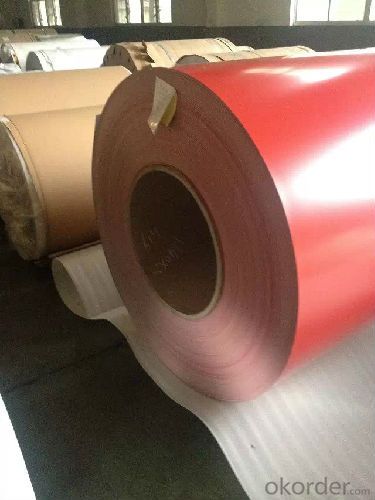
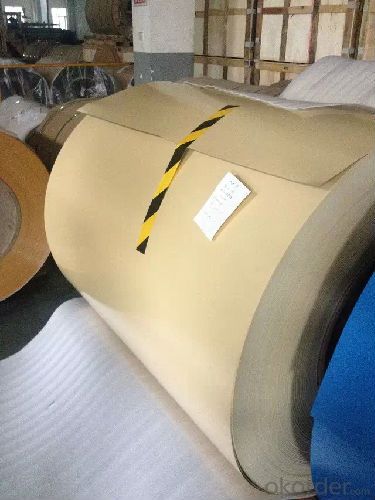
4. Specification of Coated Aluminium Coils for ACP With High Quality
Aluminum Thickness | Coating Thickness | MEK | T- Bend | Impact | Adhesion | Pencil Hardness |
0.3-1.5mm | ≥18μm | ≥100 Times | ≤2T | 50 kg•cm | 0 Grade | ≥2H |
0.2-0.28mm | ≥18μm | ≥100 Times | ≤2T | 30kg•cm | 0 Grade | ≥2H |
0.15-0.18mm | ≥18μm | ≥100 Times | ≤3T | 20 kg•cm | 0 Grade | ≥2H |
0.08-0.12mm | ≥16μm | ≥80 Times | ≤4T | 10 kg•cm | ≤1 Grade | ≥2H |
0.022-0.06mm | ≥12μm | ≥50 Times | - | - | ≤1Grade | ≥HB |
5. FAQ
1. Color of Card
PE (polyester) Coating
PE (polyester) coating: Using high molecular polymer as monomer and addition of alkyd, this PE coating method of our color coated aluminum coil is an UV-resistant coating. It can be classified matt and glossy according to coating gloss. The compact molecule structure makes paint surface luster and smooth, which assures good printing on the PE coated aluminum coils surface. With a warranty of 8-10 years for weather resistance, it is specially applied for internal decoration and sign board.
2. Color Match
For custom' color requests, we can deal as following:
a. Supply a physical sample of custom color. A color sample on metal is preferred. If other, it is also acceptable. But the color matching rate may be not good as color on metal.
b. New color sample is usually offered by our paint supplier in 5-7 days, special color should be in 7-10 days.
c. Upon receipt of color sample, please approve in writing as soon as possible. Once you approved, we will arrange purchasing and production.
Note: Color difference maybe occurred in different production batch, so it is suggested all panels are placed in one order for same project. And keep same direction as arrow on protective film when installing to avoid any color difference by vision
3. How long can we receive the product after purchase?
15-20days for general specification and 35days for special specification after receiving the deposit.
- Q:Can aluminum coils be recycled multiple times?
- Aluminum coils possess the remarkable ability to be recycled numerous times. This is due to the fact that aluminum is an exceptionally recyclable substance, and its quality remains unaltered throughout the recycling process. As a result, aluminum coils can be melted and reshaped into fresh coils on multiple occasions, without experiencing any deterioration in their performance or characteristics. The act of recycling aluminum not only aids in the preservation of natural resources, but it also conserves a significant amount of energy compared to the production of new aluminum using raw materials. Consequently, opting for aluminum coils is a sustainable and eco-friendly decision, as they can be recycled multiple times.
- Q:Are aluminum coils fire-resistant?
- Yes, aluminum coils are fire-resistant. Aluminum has a high melting point of 660 degrees Celsius (1220 degrees Fahrenheit) and it does not burn, making it a non-combustible material. This property makes aluminum coils suitable for various applications where fire resistance is a critical factor, such as in building construction, electrical wiring, and HVAC systems. Additionally, aluminum's excellent heat conductivity helps dissipate heat quickly, reducing the risk of fire. However, it is important to note that while aluminum coils themselves are fire-resistant, they may be used in systems that include other components which may not have the same level of fire resistance. It is important to consider the entire system and follow proper fire safety regulations and guidelines to ensure overall fire safety.
- Q:I know this question is not so bright, but I am very curious why do we recycle aluminum cans? Is it that they are not biodegradable?
- We recycle cans as to save energy (and money) as the processing of aluminum cans from raw materials is very energy intensive, thus remelting them down and processing new aluminum products reduces energy use.
- Q:Are there any specific maintenance requirements for aluminum coils?
- Yes, there are specific maintenance requirements for aluminum coils. Aluminum coils are commonly used in HVAC systems and require regular cleaning and maintenance to ensure optimal performance and longevity. Some of the maintenance requirements for aluminum coils include: 1. Cleaning: Regular cleaning of aluminum coils is necessary to prevent the buildup of dirt, dust, and other contaminants. This can be done using a soft brush or a vacuum cleaner with a brush attachment. It is important to clean both the fins and the surface of the coils to ensure proper airflow. 2. Inspection: Regular inspection of aluminum coils is essential to identify any signs of damage or corrosion. Look for any bent fins, leaks, or signs of wear and tear. If any issues are detected, they should be addressed immediately to prevent further damage. 3. Coil Protection: Applying a protective coating to aluminum coils can help prevent corrosion and extend their lifespan. There are various coatings available in the market specifically designed for aluminum coils, which can provide an additional layer of protection against environmental factors. 4. Air Filter Maintenance: The air filters in HVAC systems play a crucial role in maintaining the cleanliness of the coils. It is important to regularly clean or replace the air filters to prevent the accumulation of dust and debris on the coils. Clogged filters can restrict airflow and reduce the efficiency of the system. 5. Regular Maintenance Schedule: Creating a regular maintenance schedule is essential to ensure that all necessary maintenance tasks are performed on time. This can include cleaning, inspection, and any other specific requirements recommended by the manufacturer. It is important to consult the manufacturer's guidelines and recommendations for specific maintenance requirements for aluminum coils, as they may vary depending on the type of system and application. Following these maintenance requirements can help ensure that aluminum coils function efficiently and have a longer lifespan.
- Q:How are aluminum coils processed for specific surface finishes?
- Aluminum coils are processed for specific surface finishes through a series of steps that involve cleaning, pretreatment, coating, and curing. The first step in processing aluminum coils is cleaning. This involves removing any dirt, oil, or other contaminants from the surface of the coils. Cleaning is typically done using a combination of chemical cleaners and mechanical methods, such as scrubbing or brushing. After cleaning, the coils undergo a pretreatment process. Pretreatment is essential to ensure proper adhesion of the surface finish. It involves the application of a chemical solution or coating that prepares the surface of the aluminum for the subsequent coating. This step typically includes processes like etching, desmutting, and deoxidizing, which help improve the surface quality and promote adhesion. Once the coils have been cleaned and pretreated, they are ready for coating. The specific coating method depends on the desired surface finish. Some common coating techniques include coil coating, anodizing, painting, or powder coating. Coil coating involves the application of a liquid coating onto the surface of the aluminum coils. Anodizing is an electrochemical process that creates a durable and corrosion-resistant layer on the surface. Painting and powder coating involve the application of a dry paint or powder onto the coils, which is then cured to form a protective and decorative finish. After the coating is applied, the coils go through a curing process. Curing involves subjecting the coated coils to high temperatures, which causes the coating to chemically react and harden. This step is crucial for achieving the desired properties and durability of the surface finish. Overall, the processing of aluminum coils for specific surface finishes involves a combination of cleaning, pretreatment, coating, and curing steps. These processes ensure that the coils are properly prepared and coated to achieve the desired surface finish, whether it be for protection, aesthetics, or specific functional requirements.
- Q:Can aluminum coils be used for window frames?
- Yes, aluminum coils can be used for window frames. Aluminum is a popular choice for window frames due to its durability, lightweight nature, and resistance to corrosion. It is commonly used in both residential and commercial applications. Aluminum coils can be easily shaped and manipulated to fit various window sizes and styles. Furthermore, aluminum frames offer excellent thermal insulation properties, which can help improve energy efficiency in buildings. Overall, aluminum coils are a reliable and practical option for window frame construction.
- Q:What are the typical thickness tolerances for aluminum coils?
- The specific manufacturing standards and industry requirements play a role in determining the typical thickness tolerances of aluminum coils. Generally, the range of thickness tolerances for aluminum coils is between +/- 0.001 and 0.005 inches. These tolerances are crucial in maintaining the thickness of the aluminum coils within acceptable limits, ensuring they meet the desired specifications and applications. It should be emphasized that the intended use of the aluminum coils, whether for architectural, automotive, or aerospace purposes, may influence the specific tolerances.
- Q:How to calculate the weight of strips with the weight of aluminum coil known?
- Thickness*width*length=weight/density, length=weight/(density*thickness*width).Ps: Keep unit the same.
- Q:Can aluminum coils be used in electrical applications?
- Indeed, aluminum coils possess the capability for utilization in electrical applications. Its abundance in electrical wiring is attributable to its cost-effectiveness and superior conductivity in comparison to copper. Transformers, motors, generators, and other electrical apparatuses commonly rely on aluminum coils. Nevertheless, it is essential to acknowledge that copper surpasses aluminum in terms of electrical conductivity, necessitating the use of larger aluminum coils to attain equivalent levels of conductivity. Moreover, the implementation of specialized insulation and connectors becomes imperative for aluminum coils to prevent corrosion and guarantee appropriate electrical connections.
- Q:I bought some cheap aluminum foil, but one weighs much less than the other brand for the same thickness and length, why?What is the other made of? Is it still good to use for grounding something?Thank you.
- Aluminum foil is aluminum foil, it has nothing but aluminum in it. One of them is misstating the thickness, or you are mistaken about the weight or width.
1. Manufacturer Overview |
|
|---|---|
| Location | |
| Year Established | |
| Annual Output Value | |
| Main Markets | |
| Company Certifications | |
2. Manufacturer Certificates |
|
|---|---|
| a) Certification Name | |
| Range | |
| Reference | |
| Validity Period | |
3. Manufacturer Capability |
|
|---|---|
| a)Trade Capacity | |
| Nearest Port | |
| Export Percentage | |
| No.of Employees in Trade Department | |
| Language Spoken: | |
| b)Factory Information | |
| Factory Size: | |
| No. of Production Lines | |
| Contract Manufacturing | |
| Product Price Range | |
Send your message to us
Coated Aluminium Coils for ACP with High Quality
- Loading Port:
- Shanghai
- Payment Terms:
- TT or LC
- Min Order Qty:
- 5 m.t.
- Supply Capability:
- 100000 m.t./month
OKorder Service Pledge
OKorder Financial Service
Similar products
New products
Hot products
Hot Searches
Related keywords
